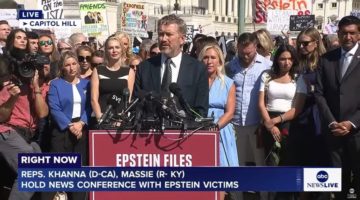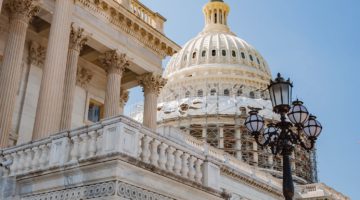WASHINGTON (AP) – President Barack Obama gave America the audacity to hope again.
After describing the U.S. economy in nearly apocalyptic terms for weeks, pushing his $787 billion stimulus plan through Congress, the president used his address to Congress on Tuesday night to tap the deep well of American optimism – the never-say-die spirit that every president tries to capture in words. And great presidents embody.
“We will rebuild. We will recover, and the United States of America will emerge stronger than before,” Obama said, echoing Franklin Delano Roosevelt and Ronald Reagan.
“The answers to our problems don’t lie beyond our reach,” Obama said. “What is required now is for this country is to pull together, confront boldly the challenges we face, and take responsibility for our future once more.”
The themes of responsibility, accountability and, above all, national community rang throughout an address carefully balanced by the gravity of its times. Job losses. Home foreclosures. Credit crisis. Rising health care costs. Declining trust in government. Obama touched all those bases.
“The impact of this recession is real, and it is everywhere,” he said.
It seemed that the president might be sticking to the dour talking points of the stimulus debate, when he warned that failure to pass the legislation would lead to a catastrophe “as deep and dire as any since the Great Depression,” one that “we may be unable to reverse.”
Fearing (and hearing) the worst, Americans supported Obama’s package and lawmakers passed it. But his rhetoric carried a risk.
Former President Bill Clinton complained that the president’s words were too much of a downer. The president from Hope, Ark., told the author of The Audacity of Hope to get back on message.
“I just want the American people to know that he’s confident that we are going to get out of this and he feels good about the long run,” Clinton told ABC’s “Good Morning America” last Friday.
Obama didn’t need Clinton’s advice. While his advisers privately criticized Clinton for second-guessing their strategy, Obama said a president must be both a realist and a cheerleader.
“I’m constantly trying to thread the needle between sounding alarmist but also letting the American people know the circumstances that we’re in,” Obama told ABC News on Feb. 10.
Indeed, advisers said at the time that Obama had already written much of his address, and they predicted that it would mark a rhetorical pivot – from selling fear to raising hopes.
And that he did.
“You should also know,” Obama told millions of viewers Tuesday night, “that the money you’ve deposited in banks across the country is safe; your insurance is secure; you can rely on the continued operation of our financial system.”
He sounded like Roosevelt, who, after closing banks briefly in the first days of his presidency, stoked the embers of American optimism.
“Confidence and courage are the essentials of success in carrying out our plan,” Roosevelt said. “Let us unite in banishing fear. We have provided the machinery to restore our financial system. It is up to you to support and make it work. It is your problem no less than it is mine.
Together we cannot fail.”
Like Roosevelt, Obama asked Americans to unite against pessimism.
“We are a nation that has seen promise amid peril, and claimed opportunity from ordeal,” Obama said. “Now we must be that nation again.”
Like Roosevelt, Obama said his government had already provided the machinery to create jobs, improve access to health care, free up credit and help struggling homeowners.
And, like Roosevelt, he challenged Americans to help fix the nation’s woes. Obama even challenged his fellow citizens to recognize their role in creating the problem.
“People bought homes they knew they couldn’t afford,” Obama said, “from banks and lenders who pushed those bad loans anyway.”
He was blunt but bullish on America.
“None of this will come without cost, nor will it be easy,” he said after spelling out his agenda. “But this is America. We don’t do what’s easy. We do what is necessary to move this country forward.”
In short, he reminded people that America has always seen itself as a “shining city upon a hill,” as one of its earliest leaders, John Winthrop, put it – a metaphor that Ronald Reagan reintroduced effectively in the 1980s.
When he addressed Congress, Reagan liked to pepper the audience with average people who did extraordinary things and epitomized the American spirit. Obama borrowed that device, inviting Ty’Sheoma Bethea to join first lady Michelle Obama in the crowd.
Bethea is an eighth-grade student who wrote Congress for help in repairing her dilapidated school, telling lawmakers that she and her fellow students will rise above their conditions because, “We are not quitters.”
And that was Obama’s bottom-line message to a shaken nation: We are not quitters.
EDITOR’S NOTE: Ron Fournier is Washington bureau chief for The Associated Press.
AP Photo/Pablo Martinez Monsivais, Pool. President Barack Obama addresses a joint session of Congress in the House Chamber of the Capitol in Washington, Tuesday, Feb. 24.








No Comment